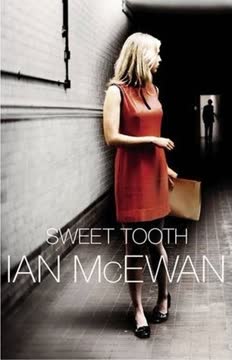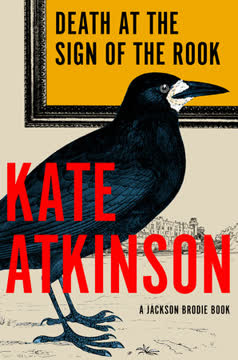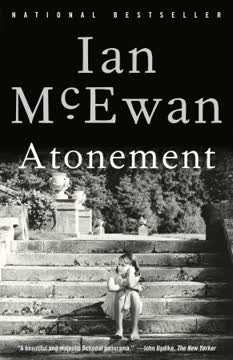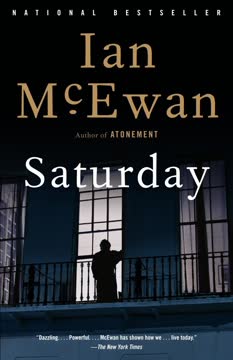Plot Summary
Serena's Secretive Mission Begins
Serena Frome, a young woman with a knack for mathematics, is unexpectedly drawn into the world of espionage. Her recruitment by MI5 marks a significant shift from her stable, literature-filled upbringing to a life of secrecy and intrigue. Despite her mathematical skills, Serena's true passion lies in literature, a fact that becomes crucial in her new role. Her journey into espionage is fraught with personal and professional challenges, including a complex relationship with her mentor, Tony Canning, which sets the stage for her future endeavors.
A Mathematician's Unexpected Path
Pushed by her mother, Serena pursues mathematics at Cambridge, despite her love for literature. This decision leaves her feeling out of place, leading to romantic entanglements and a growing disillusionment with her field. Her brief stint in student journalism reveals her passion for writing, foreshadowing her future in MI5. As she navigates university life, Serena's path is shaped by external expectations and her own quest for fulfillment, setting the stage for her eventual recruitment into the world of espionage.
Love, Betrayal, and Espionage
Serena's intense relationship with Tony Canning, a history tutor and former MI5 operative, becomes a defining aspect of her life. Their affair is passionate but ultimately doomed, as Tony's secretive nature and terminal illness lead to a dramatic breakup. Unbeknownst to Serena, Tony's actions are influenced by his illness, leaving her heartbroken and questioning her place in the world. This personal turmoil coincides with her recruitment into MI5, drawing her into a web of intrigue and deception.
The Intricacies of Sweet Tooth
Serena's assignment, codenamed "Sweet Tooth," involves influencing the cultural landscape by supporting writers whose views align with Western ideals. Her task is to recruit promising authors, offering them financial support through a front organization. This mission blurs the lines between art and politics, forcing Serena to navigate the ethical complexities of her role. As she delves deeper into literary espionage, Serena must balance her personal beliefs with her professional duties, all while maintaining her cover.
A New Assignment: Literary Espionage
Serena's mission leads her to Tom Haley, a young writer whose work has caught MI5's attention. Tasked with recruiting him, Serena is drawn to Tom's talent and charisma. Their meeting is charged with tension and mutual curiosity, as Serena must conceal her true intentions while assessing Tom's potential as an ally in the cultural Cold War. This encounter leaves Serena questioning her motives and the morality of her assignment, as she grapples with the implications of manipulating an artist's career for political ends.
The Enigmatic Tom Haley
As Serena immerses herself in Tom Haley's work, she is struck by the depth and complexity of his stories, which explore themes of love, betrayal, and identity. These themes resonate with Serena's own experiences, drawing her closer to Tom both professionally and personally. This connection complicates her mission, as Serena must reconcile her growing admiration for Tom with the demands of her role in MI5. Her journey with Tom Haley becomes a pivotal chapter in her life, shaping her understanding of loyalty, truth, and the power of storytelling.
Tom's Revelation and Serena's Dilemma
Tom Haley learns from Max Greatorex, an MI5 operative, that Serena is a spy tasked with recruiting him. This revelation shatters Tom, who initially feels betrayed and angry. However, he soon sees the situation as an opportunity to write a novel from Serena's perspective, exploring the complexities of their relationship and the espionage world. Tom decides to keep his knowledge a secret from Serena, using it as material for his writing, while grappling with his feelings of love and betrayal.
A Public Scandal Unfolds
The media uncovers the link between Tom's funding and MI5, causing a public scandal. Tom is portrayed as a pawn in a government scheme, and his integrity is questioned. Serena, unaware of Tom's knowledge, is caught in the fallout, fearing the end of her career and relationship. The revelation threatens to destroy Tom's burgeoning literary career and Serena's position within MI5. Both are forced to confront the consequences of their actions and the precariousness of their situation.
The Aftermath of Betrayal
Serena is summoned by her superiors, who demand she end her relationship with Tom and cut all ties. She is placed on probation, her future uncertain. Meanwhile, Tom, aware of the impending scandal, prepares to leave the country temporarily to escape the media frenzy. Despite the chaos, he continues to write, driven by the story unfolding around him. Serena, torn between her duty and her love for Tom, struggles with the decision she must make, knowing it could mean losing him forever.
A Proposal Amidst Chaos
In a letter left for Serena, Tom reveals his knowledge of her true identity and his decision to write a novel about their story. He confesses his continued love for her and proposes marriage, suggesting they collaborate on the book. Tom's proposal is both a declaration of love and a challenge to Serena to embrace their shared narrative, despite the deceit and betrayal that have marked their relationship. He offers her a choice: to join him in a new life or to end their relationship.
The Final Decision
Serena is left with Tom's letter and the decision of whether to accept his proposal. She must weigh her love for Tom against the risks of their past actions and the uncertain future they face. The letter represents a turning point, offering a chance for redemption and a new beginning. Serena's decision will determine the course of their lives, as well as the fate of Tom's novel and their shared story. The chapter ends with Serena contemplating her next move, the weight of her choice heavy upon her.
Characters
Serena Frome
Serena Frome is a young woman with a talent for mathematics and a passion for literature. Her recruitment into MI5 thrusts her into a world of espionage, where she must navigate personal and professional challenges. Serena's journey is marked by her complex relationships, particularly with her mentor, Tony Canning, and her target, Tom Haley. Her internal conflict between duty and desire drives the narrative, as she grapples with the ethical implications of her role in the cultural Cold War.
Tony Canning
Tony Canning is a history tutor and former MI5 operative who becomes Serena's lover and mentor. His relationship with Serena is intense but ultimately doomed, as his secretive nature and terminal illness lead to a dramatic breakup. Tony's influence on Serena is profound, shaping her understanding of loyalty and betrayal. His departure leaves Serena questioning her place in the world and sets the stage for her recruitment into MI5.
Tom Haley
Tom Haley is a young writer whose work captures the attention of MI5. Serena is tasked with recruiting him as part of her mission, but she finds herself drawn to his talent and charisma. Tom's stories explore themes of love, betrayal, and identity, resonating with Serena's own experiences. His relationship with Serena is complex, as she must balance her personal admiration for him with the demands of her role in MI5.
Max Greatorex
Max Greatorex is an MI5 operative who reveals Serena's true identity to Tom, driven by personal motives. His actions set off a chain of events that lead to the public scandal and the unraveling of Serena and Tom's relationship. Max's character is complex, marked by a mix of professional duty, personal vendetta, and a desire to disrupt the status quo. His role in the story highlights the ethical ambiguities and personal conflicts within the world of espionage.
Shirley Shilling
Shirley Shilling is Serena's friend and a successful novelist who becomes entangled in the espionage narrative. Her transformation from a colleague to a literary figure mirrors the changes in Serena's life. Shirley offers Serena a lifeline, suggesting a new career path outside of MI5. Her character represents the possibility of reinvention and the power of storytelling to shape one's destiny.
Plot Devices
Espionage and Cultural Influence
The central plot device in "Sweet Tooth" is the use of espionage to influence cultural narratives. Serena's mission involves recruiting writers whose work aligns with Western ideals, offering them financial support through a front organization. This device explores the ethical complexities of using art as a tool for political ends, blurring the lines between creativity and manipulation. The narrative examines the power dynamics at play in the cultural Cold War, as Serena navigates the moral implications of her role.
Duality and Deception
Duality and deception are recurring themes in "Sweet Tooth," reflected in the characters' personal and professional lives. Serena's role as a spy requires her to maintain a facade, concealing her true intentions from those around her. This device highlights the tension between appearance and reality, as characters grapple with their own identities and the expectations placed upon them. The narrative explores the impact of deception on relationships, trust, and self-perception, adding depth to the story's exploration of loyalty and truth.
The Power of Storytelling
Tom's decision to write a novel about his and Serena's story highlights the power of storytelling to make sense of complex emotions and events. The act of writing becomes a means of processing betrayal and love, offering a path to redemption and a new beginning. This plot device underscores the transformative potential of narrative and the ways in which fiction can illuminate the human experience.
Analysis
"Sweet Tooth" by Ian McEwan is a nuanced exploration of love, identity, and truth set against the backdrop of Cold War espionage. The novel delves into the ethical complexities of using art as a political tool, highlighting the blurred lines between creativity and manipulation. Through Serena's journey, McEwan examines the tension between personal desires and professional obligations, as well as the impact of deception on relationships and self-perception. The narrative underscores the power of storytelling to illuminate the human experience, offering a path to understanding and redemption. Ultimately, "Sweet Tooth" is a meditation on the choices we make and the stories we tell, both to ourselves and to others.
Last updated:
FAQ
Synopsis & Basic Details
What is Sweet Tooth about?
- A Cold War recruitment: Sweet Tooth follows Serena Frome, a bright but naive Cambridge mathematics graduate in 1972, who is unexpectedly recruited by MI5. Her initial role is clerical, but she is soon assigned to a secret cultural program, codenamed "Sweet Tooth," designed to subtly influence public opinion during the Cold War.
- Literary espionage mission: Serena's mission is to identify and financially support promising young writers whose work aligns with Western democratic ideals, without their knowledge of the government funding. This involves creating a front organization, the Freedom International Foundation, to channel funds.
- Love, lies, and literature: The narrative centers on Serena's entanglement with Tom Haley, a talented but struggling novelist she is tasked with recruiting. As their professional relationship deepens into a passionate affair, Serena grapples with the ethical complexities of her deception, leading to a dramatic unraveling of her personal and professional life.
Why should I read Sweet Tooth?
- Metafictional brilliance: Ian McEwan masterfully employs metafiction, blurring the lines between author, narrator, and character, culminating in a stunning twist that recontextualizes the entire narrative. This intricate layering invites readers to question the nature of storytelling and truth itself.
- Rich historical immersion: The novel vividly recreates 1970s Britain, from the political turmoil of the Cold War, miners' strikes, and energy crises to the cultural shifts in literature, music, and social attitudes. It offers a compelling blend of personal drama against a meticulously researched historical backdrop.
- Deep psychological insight: McEwan delves into the complex inner lives of his characters, particularly Serena's journey of self-discovery, moral compromise, and emotional growth. Readers will find themselves deeply invested in her struggles with love, loyalty, and the ethical dilemmas of her secret life.
What is the background of Sweet Tooth?
- Cold War cultural battle: The novel is set against the backdrop of the cultural Cold War, where Western intelligence agencies, like the CIA and MI5, secretly funded artistic and intellectual endeavors to counter Soviet propaganda. This historical context, including references to Encounter magazine and Operation Mincemeat, highlights the real-world strategies of ideological influence.
- 1970s British malaise: McEwan meticulously details the socio-political climate of early 1970s Britain, characterized by industrial unrest, economic decline, energy crises, and the escalating Troubles in Northern Ireland. This atmosphere of national anxiety and disillusionment provides a stark contrast to the personal dramas unfolding.
- Literary and academic landscape: The story immerses itself in the literary world of the era, referencing prominent authors, publishing houses, and academic debates. It explores the tension between highbrow and popular fiction, and the evolving role of intellectuals in public discourse, particularly concerning political engagement.
What are the most memorable quotes in Sweet Tooth?
- "Woe to the nation whose literature is disturbed by the intervention of power.": This quote, attributed to Solzhenitsyn and recalled by Serena, encapsulates the central thematic conflict of the novel: the inherent danger and moral compromise when state power attempts to manipulate artistic expression. It foreshadows the ethical dilemma at the heart of the "Sweet Tooth" operation.
- "The line between what people imagine and what's actually the case can get very blurred. In fact that line is a big grey space, big enough to get lost in.": Max Greatorex delivers this warning to Serena, which serves as a profound meta-commentary on the novel's own structure and themes. It highlights the narrative's exploration of unreliable memory, self-deception, and the subjective nature of truth, especially in espionage and storytelling.
- "To recreate you on the page I had to become you and understand you (this is what novels demand), and in doing that, well, the inevitable happened. When I poured myself into your skin I should have guessed at the consequences. I still love you. No, that's not it. I love you more.": From Tom Haley's concluding letter, this quote reveals the ultimate metafictional twist and the profound emotional impact of the creative process. It underscores the novel's exploration of empathy, identity, and the power of storytelling, suggesting that true understanding can lead to unexpected love.
What writing style, narrative choices, and literary techniques does Ian McEwan use?
- First-person unreliable narration: The novel is told entirely from Serena Frome's perspective, creating an intimate yet inherently biased account. Her self-deception, naivety, and later, her emotional turmoil, color her perceptions, making the reader question the absolute truth of events, especially concerning her motivations and the actions of others.
- Metafiction and self-referentiality: McEwan masterfully blurs the lines between fiction and reality, culminating in Tom Haley's revelation that he is writing the very story the reader is consuming. This technique challenges the reader's suspension of disbelief and invites reflection on the construction of narratives, both personal and literary.
- Meticulous detail and sensory immersion: McEwan's prose is characterized by precise, evocative descriptions of settings, objects, and sensory experiences, from the "clammy intimate scent" of Serena's bedcover to the "oily, littered grass" of the lay-by. This rich detail grounds the fantastical elements of espionage in a tangible, believable world, enhancing the reader's immersion.
Hidden Details & Subtle Connections
What are some minor details that add significant meaning?
- The Welsh castle bookmark: Tony Canning's gift of a green leather bookmark embossed with a Welsh castle, initially dismissed as "holiday gift-shop kitsch," becomes a cherished "love token" for Serena after his death. This seemingly trivial object symbolizes her enduring, albeit complicated, connection to Tony and her romanticized memory of their affair, even as she uses it in her new life with Tom.
- The "k" in Springklene: The van used for Serena and Shirley's cleaning cover has "Springklene" written on its side, with the 'k' depicted as a "gleeful housemaid wielding a feather duster." This detail subtly foreshadows Serena's eventual role as a "cleaning lady" for MI5, highlighting the mundane reality of her espionage work and the ironic contrast with her romanticized self-image.
- Tom's "Faerie Queene" tutorial: When Serena first meets Tom, he is about to teach a "Faerie Queene tutorial" to two students. This detail subtly links Tom to Edmund Spenser's epic poem, which later becomes the subject of Tom's academic monograph. It foreshadows his intellectual depth and his eventual return to academia, contrasting with the "Sweet Tooth" project's focus on fiction.
What are some subtle foreshadowing and callbacks?
- Tony's unexplained chest scar: Early in the novel, Serena notes Tony Canning's "white four-inch scar to the right of his chest reaching towards his neck, whose history he would never explain." This detail subtly foreshadows his past as an SOE operative, wounded during the war, and his later recruitment into MI5, hinting at a deeper, more dangerous history than Serena initially perceives.
- Max's "big grey space" warning: Max's philosophical warning to Serena about the blurred line between imagination and reality ("big enough to get lost in") directly foreshadows the novel's metafictional ending. It hints that Serena's perception of events, and indeed the entire narrative, might be a construct, a story shaped by desire and interpretation.
- The "pig-in-a-trough" mode: Serena's playful description of Tom's passionate lovemaking as his "pig-in-a-trough mode" is later echoed in Tom's letter, where he admits to incorporating this intimate detail into his novel. This callback highlights the constant surveillance and appropriation of their shared life for his art, blurring the boundaries between their private moments and his creative output.
What are some unexpected character connections?
- Shirley Shilling's literary success: Serena's working-class friend, Shirley, initially dismissed as a "token prole" and later sacked from MI5, unexpectedly reappears as a successful novelist. Her transformation into a published author, with film rights being sought, creates a surprising parallel to Tom Haley's career and offers Serena an alternative path outside of espionage, highlighting the novel's theme of reinvention.
- Max Greatorex's personal vendetta: Max's seemingly principled opposition to "Sweet Tooth" and his decision to expose Serena and Tom are revealed to be driven by personal bitterness and jealousy. His confession to Tom that he was "indiscreet because all he cared about was destroying you" (Serena) reveals a deeper, more emotional connection to Serena than she realized, stemming from his unrequited feelings and broken engagement.
- Tony Canning's blackmail: The revelation that Tony Canning was blackmailed into spying for the Soviets, rather than acting out of ideological conviction, fundamentally alters Serena's understanding of his character and their relationship. This unexpected motive connects his past betrayal to his later "gift" of recruiting Serena, suggesting a complex web of personal and political compromises.
Who are the most significant supporting characters?
- Shirley Shilling, the pragmatic confidante: Shirley serves as Serena's closest friend and a foil, representing a grounded, working-class perspective on life and politics. Her transformation into a successful author and her offer of a job to Serena underscore themes of social mobility, female ambition, and the possibility of a life beyond MI5's influence.
- Max Greatorex, the conflicted insider: Max is more than just Serena's superior; he's a complex character driven by intellectual principles, unrequited affection for Serena, and a deep-seated disillusionment with the Service. His role as the informant who exposes Serena and Tom is pivotal, revealing the personal costs and moral ambiguities within the intelligence world.
- Peter Nutting, the architect of "Sweet Tooth": Nutting embodies the bureaucratic and ideological forces behind the cultural Cold War. His character highlights the "great and good" establishment figures who, despite their seemingly noble intentions, engage in manipulative schemes. His interactions with Serena reveal the paternalistic attitudes towards women in the Service and the inherent cynicism of the operation.
Psychological, Emotional, & Relational Analysis
What are some unspoken motivations of the characters?
- Serena's yearning for validation: Beneath her intellectual aspirations and rebellious facade, Serena deeply craves approval, particularly from older, authoritative men like Tony Canning and later, Peter Nutting. Her initial enthusiasm for MI5, despite its lowly clerical role, stems from a desire to "do her bit for the country" and gain recognition, a motivation subtly linked to her mother's ambition for her.
- Tony's expiation: Tony's elaborate deception to push Serena away before his death is driven by a desire for expiation, not just for his affair, but for his past as a Soviet agent. He orchestrates her recruitment into MI5 as a "gift" in the "spirit of expiation," hoping to secure her future and perhaps atone for his own betrayals, making his cruelty a twisted act of love.
- Tom Haley's artistic opportunism: While Tom genuinely falls in love with Serena, his decision to keep her MI5 identity a secret and write a novel about their affair reveals a profound artistic opportunism. His motivation is not purely vindictive but stems from a writer's insatiable need for compelling material, transforming personal betrayal into creative fuel, as he states, "I was a novelist without a novel, and now luck had tossed my way a tasty bone."
What psychological complexities do the characters exhibit?
- Serena's self-deception and compartmentalization: Serena consistently rationalizes her actions and suppresses uncomfortable truths, particularly regarding her complicity in the "Sweet Tooth" operation and her feelings for Tom. Her ability to compartmentalize her life—being a dutiful daughter, a secret agent, and a passionate lover—reflects a psychological defense mechanism against the moral ambiguities of her choices.
- Tom's blend of innocence and cunning: Tom appears initially as a naive, struggling artist, but his later actions reveal a shrewd, calculating mind. His ability to absorb and transform personal experiences, including Serena's betrayal, into compelling fiction demonstrates a complex interplay of vulnerability and artistic ruthlessness, making him both a victim and a manipulator.
- Max's intellectual pride and emotional vulnerability: Max Greatorex, despite his academic background and disdain for "Sweet Tooth," is deeply affected by personal slights. His decision to expose Serena and Tom is fueled by a wounded ego and jealousy over Serena's affections, revealing a hidden emotional fragility beneath his stiff, intellectual exterior.
What are the major emotional turning points?
- Serena's breakdown at her father's embrace: Upon returning home for Christmas, Serena unexpectedly breaks down in her father's arms, crying "copious hopeless sort of crying." This moment, triggered by the Bishop's "kindly, falling tone," signifies a release of accumulated emotional stress, guilt, and loneliness from her secret life, revealing the profound toll of her deception.
- Tom's discovery of Serena's identity: Max Greatorex's revelation to Tom about Serena's MI5 role is a devastating emotional turning point. Tom's initial "new dark place of hatred" for Serena quickly transforms into a writer's opportunity, demonstrating his capacity to transmute personal pain into creative material, a pivotal shift in his emotional landscape.
- Serena's "I love you" on the beach: The moment Serena finally reciprocates Tom's declaration of love on the Brighton beach is a peak of emotional intensity. However, it is immediately followed by the realization that "before this love began to take its course, I would have to tell him about myself. And then the love would end." This bittersweet climax underscores the tragic irony of their relationship, where love and deception are inextricably linked.
How do relationship dynamics evolve?
- Serena and Tony: From infatuation to posthumous betrayal: Their affair begins with Serena's infatuation with Tony's worldliness and ends with his calculated, "selfless cruelty" to protect her from his terminal illness. The posthumous revelation of his past as a blackmailed spy transforms Serena's grief into a complex mix of admiration, anger, and a sense of inherited burden, shaping her entry into MI5.
- Serena and Max: From mentorship to rivalry and resentment: Their relationship shifts from Max's initial, almost paternal, guidance and flirtation to a bitter rivalry fueled by unrequited love and professional jealousy. Max's exposure of Serena and Tom is a direct consequence of his wounded pride, transforming their dynamic into one of mutual accusation and manipulation.
- Serena and Tom: From professional target to entangled lovers: What begins as a clandestine recruitment mission evolves into a passionate, deeply intimate relationship. Their dynamic is constantly shadowed by Serena's secret, culminating in Tom's discovery and his decision to incorporate their story into his novel, transforming their love into a complex, metafictional collaboration.
Interpretation & Debate
Which parts of the story remain ambiguous or open-ended?
- The true extent of MI5's influence: While the "Sweet Tooth" operation is exposed, the novel leaves open the question of how deeply MI5's cultural interventions truly shaped the literary landscape or public opinion. The effectiveness of such "soft Cold War" tactics remains debatable, highlighting the inherent difficulty in measuring ideological influence.
- Serena's ultimate fate and career: Although Serena is placed on probation and faces dismissal, her final decision regarding Tom's proposal is left to the reader. Her future career path, whether she accepts Shirley's offer or finds another way, remains unresolved, emphasizing the ongoing uncertainty of her life beyond the Service.
- The nature of Tom and Serena's future relationship: Tom's proposal for a "collaboration" on his novel, which is also their love story, suggests a future together, but one built on a foundation of mutual surveillance and artistic appropriation. The ambiguity lies in whether such a relationship can truly be loving and equitable, or if it will perpetuate a cycle of deception and exploitation.
What are some debatable, controversial scenes or moments in Sweet Tooth?
- Serena's complicity in "Sweet Tooth": A key debate revolves around Serena's moral responsibility for participating in a deceptive state propaganda program. While she initially rationalizes it as a "clandestine Arts Council," her growing awareness of its manipulative nature, particularly after Tom's exposure, forces readers to question her ethical compromises and the extent of her naivety.
- Tom Haley's artistic exploitation of Serena: Tom's decision to write a novel about his affair with Serena, incorporating her secrets and vulnerabilities without her knowledge, raises questions about artistic ethics and personal betrayal. Readers may debate whether his act is a legitimate creative process or a cruel exploitation of their intimacy, especially given his initial anger at her deception.
- The "Monty Hall Problem" as a metaphor: Serena's explanation of the Monty Hall Problem to Tom, and his subsequent misapplication of its logic in his story "Probable Adultery," sparks a debate about the intersection of logic, intuition, and narrative. It highlights the novel's exploration of how individuals interpret and misinterpret information, both in real life and in fiction, and how these interpretations shape their realities.
Sweet Tooth Ending Explained: How It Ends & What It Means
- The metafictional revelation: The novel concludes with Tom Haley's letter to Serena, revealing that he has known about her MI5 identity all along, thanks to Max Greatorex. More significantly, he confesses that the entire narrative the reader has just experienced is, in fact, his novel, Sweet Tooth, written from Serena's perspective. This twist shatters the fourth wall, recontextualizing every event and character as part of a fictional construct.
- Love born from mutual surveillance: Tom's letter proposes a future where their love and marriage are intertwined with their shared history of deception and his ongoing artistic project. He suggests their "mutual surveillance" has bound them, transforming betrayal into a unique form of intimacy. This ending challenges conventional notions of love and trust, positing that a relationship can thrive even when built on a foundation of profound secrets and artistic appropriation.
- Serena's agency and the power of storytelling: The final decision rests with Serena: to accept Tom's proposal and collaborate on his novel, effectively becoming a co-author of her own story. This ending grants Serena a form of agency, allowing her to shape her narrative and reclaim her identity, even within the confines of Tom's creation. It underscores the novel's central theme that storytelling is not merely a reflection of reality but a powerful force that can shape, transform, and even redeem human experience.
Review Summary
Sweet Tooth receives mixed reviews, with praise for McEwan's writing style, character development, and clever plot twists. Critics appreciate the novel's exploration of Cold War-era espionage, literature, and relationships. However, some find the pacing slow and the protagonist unlikable. The metafictional aspects and ending are divisive, with some readers finding them brilliant and others feeling manipulated. Many reviewers note the book's focus on the writing process and the power of words, though some criticize the portrayal of female characters and the novel's self-indulgent tendencies.
Similar Books
Download PDF
Download EPUB
.epub digital book format is ideal for reading ebooks on phones, tablets, and e-readers.









